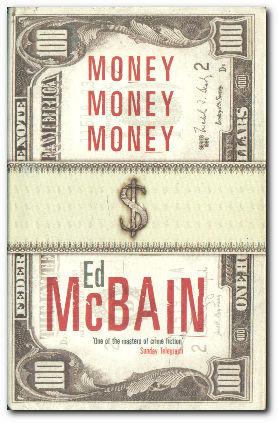

Thanks to the book exchange at my local train station (I owe them a lot of books), I recently discovered crime writer Ed McBain. Real name Evan Hunter - formerly Salvatore Lombino - McBain wrote 55 books in his 87th Precinct series about a squad of detectives working in the fictional city of Isola (a barely disguised New York City). The main character is usually Detective Steve Carella, but the series also features a large ensemble of secondary characters that reappear from book to book.
The two McBain novels I happened upon at the book exchange were Killer's Wedge (1959) and Money Money Money (2001). Killer's Wedge features an intriguing double-plot structure: the first thread involves a woman named Virginia Dodge holding the squad-room hostage with explosives while she awaits the return of her intended victim, Detective Carella, while the second plot strand follows the case Carella is out working on, which is a locked-room murder mystery in an old mansion complete with feuding family members and a shifty butler. The way these two threads are weaved together is masterful, with Carella's investigation actually serving as something of breather from the knuckle-whitening tension of the hostage situation back at the station.
I was curious as to whether the series would have changed much over the 42 years that seperate Killer's Wedge from Money Money Money. It both has and hasn't. McBain employs a floating timeline that means the books are always set roughly in the present - whenever that might be at the time of release - while the characters stay the same age, meaning that everyone from Killer's Wedge is still around in Money Money Money. The actual style of the books, however, has undergone a significant shift: where Killer's Wedge was a lean 159 pages, Money Money Money is over twice that length and features a sprawling plot involving a huge cast of characters. A less skilled author could easily tie himself in knots with a story like this, but McBain takes it all in stride, weaving a compelling tale of counterfeit banknotes, international drug smuggling, and scheming terrorists. Given the book's release date of 6th September 2001, some of the aspects of the story take on an even more chilling edge in light of the events that occurred five days later, and McBain addresses this terrible coincidence in the afterword.
It's not all bleakness, however. Another change from the earlier book is that the morbid humour has been cranked up. There's a sequence where the Larry David-esque Detective Ollie Weeks calls round to a woman's house to tell her that her husband has been murdered. During the conversation, he notices a freshly-baked cake sitting on the kitchen sideboard, and gradually begins to resent the grieving widow for not offering any to him. Another scene features the detectives discussing the best actors to play US Presidents in movies, with special praise reserved for Harrison Ford as President James Marshall in Air Force One. It's in scenes like this that McBain proves himself a master of dialogue, assigning a distinctive voice to even the most marginal of characters.
Both Killer's Wedge and Money Money Money are great crime novels, the kind that simultaneously leave you fully satisfied yet eager for more. I'm looking forward to (hopefully) reading the other 53(!).